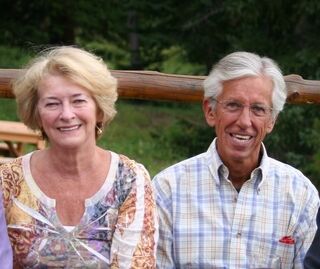
Dementia
Living a Purposeful Life With Dementia
Dementia patients demonstrate how life can be meaningful even with a diagnosis.
Posted November 9, 2020

They possess a positive outlook and zest for life.
An ultramarathoner and adventure racer, Mark Macy competed in the World’s Toughest Race Eco-Challenge in Fiji last year and, more recently, the Leadville 100,000 FT Elevation Gain Challenge this summer.
A retired chief operating officer of a long-term care facility, Geri Taylor and her husband, Jim Taylor, are frequent public speakers at national and global conferences and strong advocates for clinical trials.
In their own ways, Mark and Geri live life to the fullest as individuals and with their families. A retired attorney, Mark has been married to his high school sweetheart, Pam Macy, for 43 years, and they have three kids, while Geri and her husband, married for 26 years, share four children.
Not only are Mark, 67, and Geri, 77, living in the moment; they are also living with Alzheimer’s Disease.
November Is National Alzheimer’s Disease Awareness Month
In 1983, President Ronald Reagan* designated November as National Alzheimer’s Disease Awareness Month. Thirty-seven years later, awareness is more crucial than ever. More than 5 million Americans live with Alzheimer’s in the United States today, and by 2050, that number will skyrocket to 14 million.
To bring awareness, people are encouraged to keep the dialogue ongoing, seek out information, and break down the stigma associated with dementia.
But while information can be educational, it can also be harmful. Sixty to 80 percent of Internet users obtain their health information online, and with no regulation to ensure accuracy, the Internet abounds with misinformation.
We take this time to dispel the myth that a person can’t live a meaningful life with a diagnosis and also honor those living with dementia, like Mark and Geri, who demonstrate courage, resilience, and positivity.
Living a Purposeful, Productive Life
“A misconception is that an Alzheimer’s diagnosis is a death sentence, when in fact, a person can live a purposeful and productive life for many years,” said George Vradenburg, co-founder and board chair of UsAgainstAlzheimer’s. “My mother-in-law was a strong, articulate, smart woman who was able to serve for years in a civic and political capacity even with the declining cognitive capacity due to Alzheimer’s.”
Unfortunately, it is a myth believed by many: two-thirds of those surveyed by the Alzheimer’s Society felt life was over with a diagnosis. And almost one in four thought that those with a diagnosis would instantly have to stop going out for a walk on their own.
The reality? The life expectancy of someone diagnosed with Alzheimer’s varies between three to 11 years (or more) depending on the stage of the disease.
Mark and Geri stomp out this myth and demonstrate how meaningful lives can be lived even with dementia.

The Taylors
“If you think your life is over when you’re diagnosed, guess what? That becomes a self-fulfilling prophecy, and you’re not going to be a happy person,” said Jim. “You’re going to let your care partner do too much for you, and in the process, you lose your own confidence and self-worth being overly cared for.”
As Geri's Alzheimer’s progresses, it is increasingly more challenging for her to speak. Despite this, Geri remains fiercely independent. “I really want to speak for myself,” she said.
“We really try to counsel against doing tasks for someone with Alzheimer’s who can manage perfectly well for themselves,” said Jim. “Geri’s been very strict with me about what I can and can’t do. I try not to cross the line because I’ll get in trouble!”
Prior to Geri’s diagnosis, the couple had intended to embark on a project together upon retirement, but nothing appealed to them. “All of a sudden, something found us,” said Jim. “We realized very quickly there was a need to dispel these myths about the disease, to educate, and to increase participation in clinical trials.” They had found their calling.
The couple is fervent about what they do and has shared their story with others nationally and globally; their story and advocacy work was even featured in The New York Times. They also recently won the 2020 Perennial Hero Award by the Alliance for Aging Research.
Additionally, the Taylors are trying to start a pilot trial in New York City that will assist newly diagnosed patients in improving their quality of life in the first year and helping navigate them to find research.

The Macys
While navigation, numbers, and reading are now challenging for Mark Macy, he maintains a can-do attitude and continues his active lifestyle with the support of his family. Together with his son, Travis Macy, and two teammates, they competed as Team Endure on the Eco-Challenge, a 417-mile, 11-day, multi-sport race.
“When we learned about the diagnosis, it was obviously not good news,” said Travis. “But we said, let’s keep making the most of things, let’s keep on living fully, and the Eco-Challenge was a big piece of that.”
An athlete who has dabbled in just about every sport from a young age, Mark has checked off a long list of endurance races, including the Badwater Ultramarathon and 100-mile snowshoe Idaitarod trail races. So it was no surprise that it was his idea to do the Eco-Challenge. “It’s what I’ve been doing forever,” said Mark, who has done every other Eco-Challenge. “That’s just what I do; I do that stuff all my life, and it’s normal to me.”
While even a healthy person might have seen the race as a risk given the strenuousness of the event and the location, the father-son team was undeterred. “The risk of throwing in the towel and not going was higher,” said Travis. “A diagnosis doesn’t mean the end of things; you can keep living fully even if it changes over time.”
Although Mark experienced some challenges due to Alzheimer’s, he kept up with his teammates. “I was not the guy I’ve been all my life,” said Mark. "But I was still capable of doing just about anything any old guy could do. Travis and the team helped me out every now and again.”
After seven grueling days, they felt it best to leave the race as the expedition became more challenging. “It was pretty devastating,” said Mark. “I’ve never dropped out of a race before. My teammates didn’t get to finish the race simply because of me. It’s not a good feeling.”
Travis was supportive, and it can be easy to see why Team Endure won the Spirit of Eco-Challenge award for their grit, teamwork, and overall spirit. “I think we did a great job, it was a hard course, but we had a ton of fun, laughed a whole lot, and just enjoyed the company,” said Travis.
Coping With Alzheimer’s
While the Macys and Taylors have never met, they share similar advice toward life and coping with Alzheimer’s.
“We try to joke about it as much as possible,” said Jim. “It’s just a fact of life for us, and it’s more painful if you can’t get it out and find the humor in it. Think positive and happy.”
The Taylors also encourage living life passionately. “One of the major things Geri emphasizes is to live fully with Alzheimer’s,” said Jim. “There are so many resources online; why not take this opportunity to educate yourself about something new?”
The Macy family are on the same wavelength. “Whether it is Alzheimer’s or another diagnosis, add some humor to it—keep things fun and laugh; that has been a great tool for our family,” said Travis.
And from Mark himself, “Don’t quit. One of these days, someone’s going to come up with something that’s going to make all of us well. I’m not giving up on that. Maybe I’ll be 90 by then, and I’ll go to the Eco-Challenge when I’m 90, and that’ll be cool.”
Dementia Awareness Throughout the Year
It’s important to carry forth the message of dementia awareness and education not just during November but throughout the year.
- Share inspirational stories. If you or someone you know is diagnosed with dementia, let the Macys and Taylors’ lives be testaments that life goes on—and in their cases, even fired up.
- Live life to the fullest—take charge of your brain health. Test your cognition early, monitor regularly, and take action if there are signs of decline.
- Make healthy lifestyle changes—up to 40 percent of dementia globally can be prevented.
This November and going forward, how will you bring awareness to dementia? What will you do to dispel its myths?
*Unfortunately, in 1994, Reagan was diagnosed with Alzheimer’s and passed away in 2004. Reagan and his wife Nancy were strong advocates for Alzheimer’s research, fundraising millions for its advancement.
References
Proclamation 5405 -- National Alzheimer's Disease Month, 1985. (1985, November 8). Ronald Reagan Presidential Library and Museum. Retrieved from https://www.reaganlibrary.gov/archives/speech/proclamation-5405-national-alzheimers-disease-month-1985
Cedars-Sinai Staff. (2020, June 12). Myths about Dementia, Alzheimer’s and Memory Loss. Cedars-Sinai Blog . Retrieved from https://www.cedars-sinai.org/blog/dementia-alzheimers-and-memory-loss.html
Myths. (n.d.) Alzheimer’s Association. Retrieved from https://www.alz.org/alzheimers-dementia/what-is-alzheimers/myths
Disclosure of diagnosis. (n.d.). Alzheimer’s Association. Retrieved from https://www.alz.org/professionals/health-systems-clinicians/dementia-diagnosis/disclosure-of-diagnosis
Value of Knowing. (2014, November 14). Harvard School of Public Health, Alzheimer's Europe. Retrieved from http://www.alzheimer-europe.org/Research/Value-of-knowing
World Alzheimer Report 2019: Attitudes to dementia. (2019). Alzheimer’s Disease International. Retrieved from https://www.alz.co.uk/research/world-report-2019
von Muhlen, M., & Ohno-Machado, L. (2012). Reviewing social media use by clinicians. Journal of the American Medical Informatics Association : JAMIA, 19(5), 777–781. https://doi.org/10.1136/amiajnl-2012-000990
Childs, L. M., & Martin, C. Y. (2012). Social media profiles: striking the right balance. American journal of health-system pharmacy : AJHP : official journal of the American Society of Health-System Pharmacists, 69(23), 2044–2050. https://doi.org/10.2146/ajhp120115
Powell, J. A., Darvell, M., & Gray, J. A. (2003). The doctor, the patient and the world-wide web: how the internet is changing healthcare. Journal of the Royal Society of Medicine, 96(2), 74–76. https://doi.org/10.1258/jrsm.96.2.74
Alzheimer's stages: How the disease progresses. (n.d.). Mayo Clinic. Retrieved from
https://www.mayoclinic.org/diseases-conditions/alzheimers-disease/in-depth/alzheimers-stages/art-20048448#:~
Why Participate in a Clinical Trial? (n.d.). Alzheimer’s Association. Retrieved from https://www.alz.org/alzheimers-dementia/research_progress/clinical-trials/why-participate
Facts and Figures. (n.d.). Alzheimer’s Association. Retrieved from https://www.alz.org/alzheimers-dementia/facts-figures
10 Facts on Dementia. (2019, September). World Health Organization. Retrieved from https://www.who.int/features/factfiles/dementia/en/



